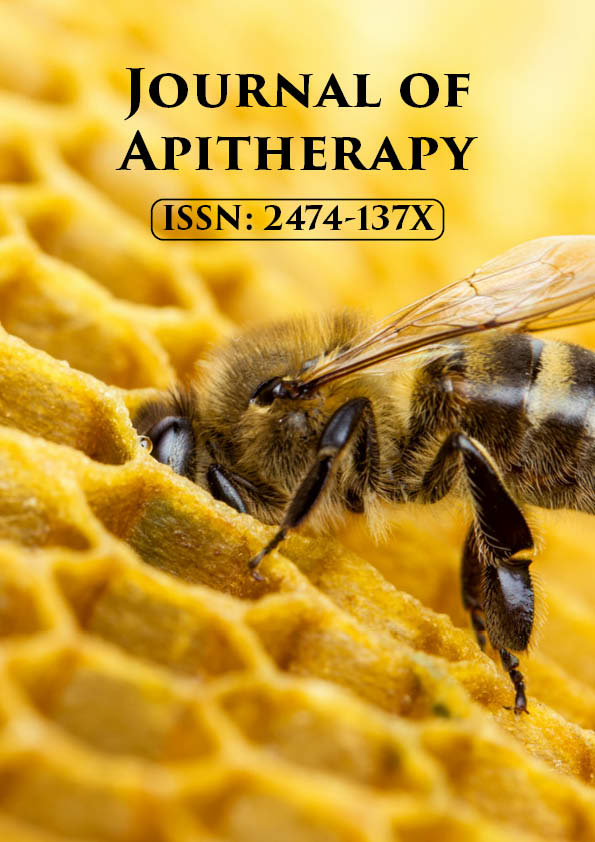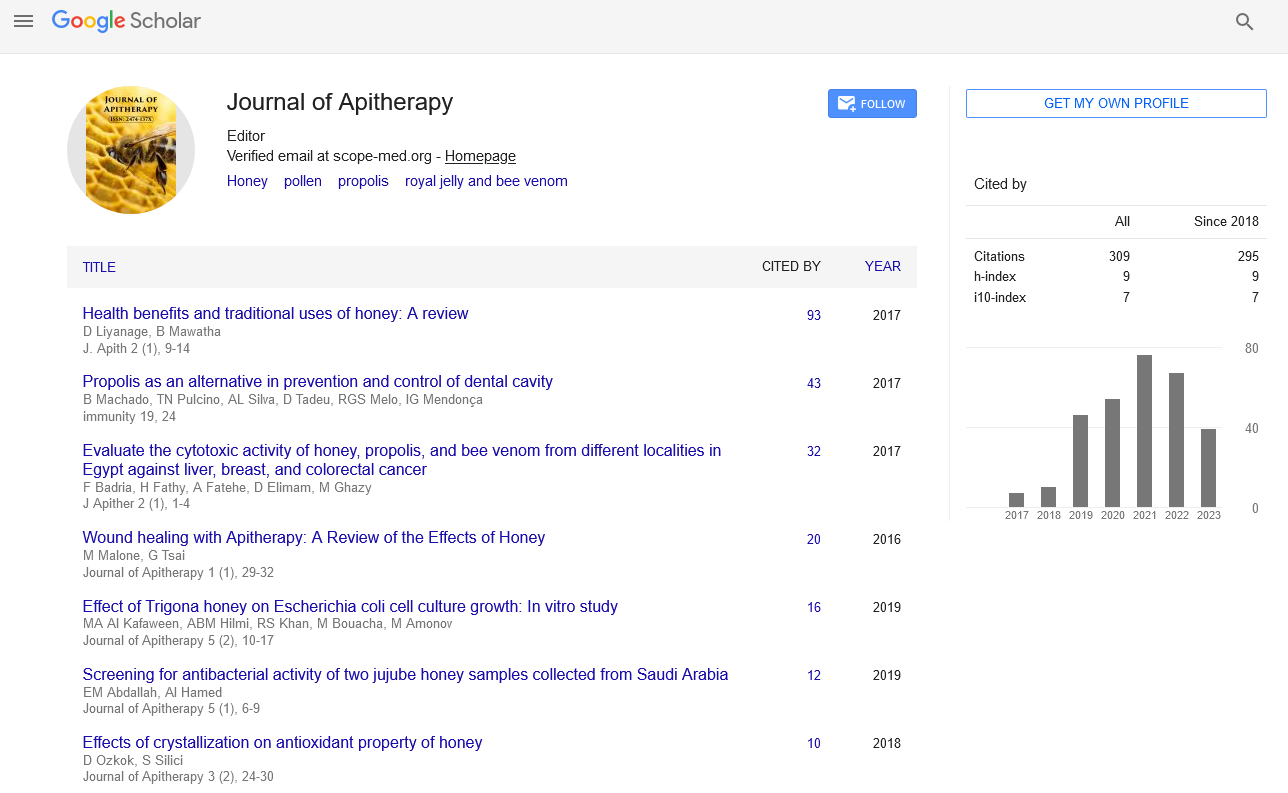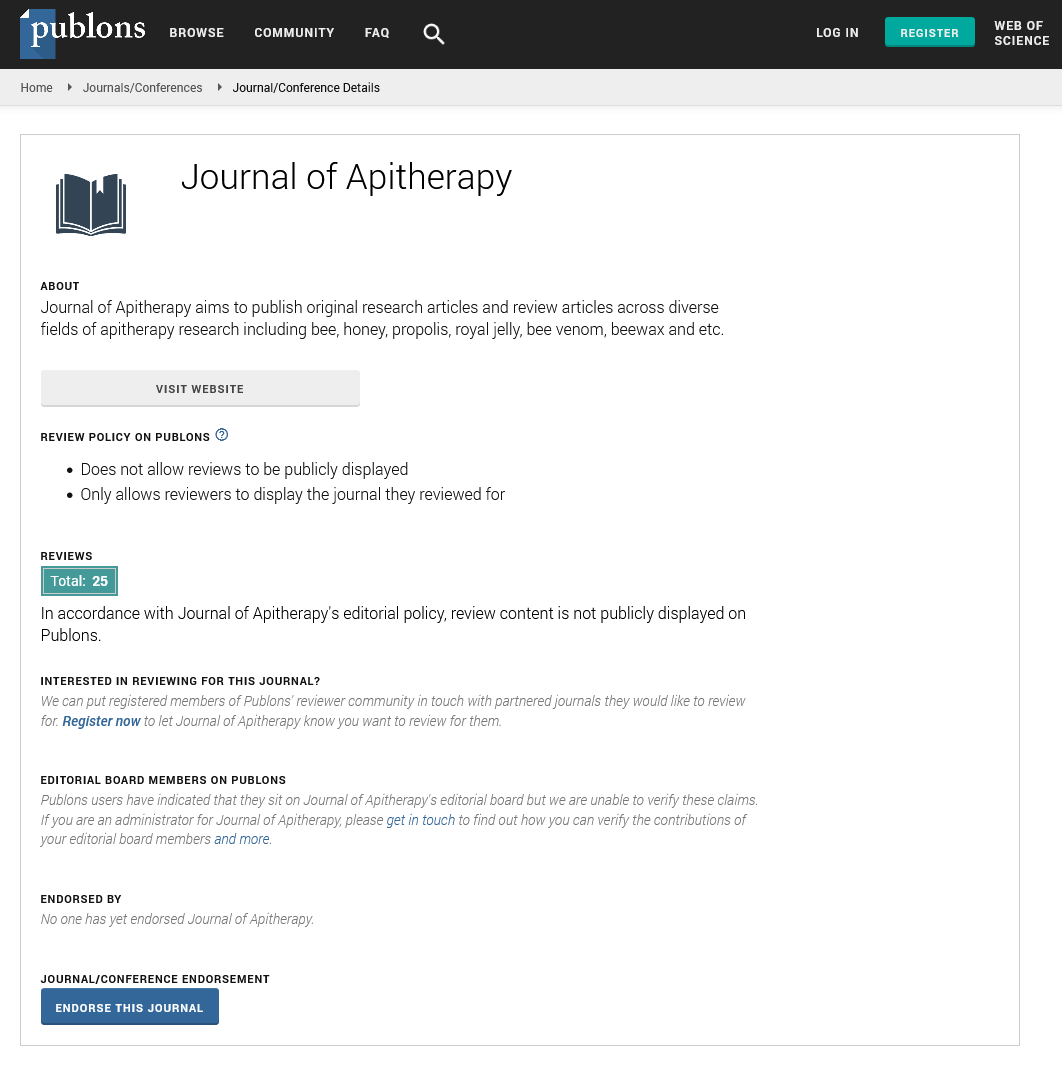Perspective Article - Journal of Apitherapy (2023)
Propolis and its Role in Wound Healing and Anti-Inflammatory Triumphs
Manasa Jia*Manasa Jia, Department of Agriculture, University of Helsinki, Helsinki, Finland, Email: manasa@gmail.com
Received: 09-Nov-2023, Manuscript No. JAPITHERAPY-23-123578; Editor assigned: 13-Nov-2023, Pre QC No. JAPITHERAPY-23-123578 (PQ); Reviewed: 22-Nov-2023, QC No. JAPITHERAPY-23-123578; Revised: 29-Nov-2023, Manuscript No. JAPITHERAPY-23-123578 (R); Published: 07-Dec-2023
Description
In the realm of apitherapy, propolis emerges as a potent and versatile substance with a rich history of healing. Known as "nature's defender," propolis is a resinous mixture that honeybees create by combining saliva, beeswax, and botanical exudates. This essay delves into the captivating world of "Propolis-based Healing," exploring the multifaceted therapeutic potential that propolis offers for promoting health and well-being.
The essence of propolis
Propolis serves as a natural protector within the beehive. Bees meticulously gather resins from tree buds, sap flows, and botanical sources, and then blend them with their own enzymes and beeswax. This combination yields propolis, a sticky and complex substance that bees use to seal and disinfect their hive. This natural resin has captured the attention of researchers and health enthusiasts alike due to its diverse array of bioactive compounds.
Chemical composition and bioactive compounds: Propolis is a reservoir of bioactive compounds, and its chemical composition can vary based on geographic location, plant sources, and bee species. Flavonoids, phenolic acids, terpenes, and essential oils are among the key constituents responsible for propolis's therapeutic properties.
Immune support and antimicrobial properties: One of the standout features of propolis is its ability to support the immune system. The antimicrobial properties of propolis are well-documented, with bees using it to create a hygienic environment in the hive. In human health, propolis has been explored for its potential to combat bacteria, viruses, and fungi. Research suggests that propolis may inhibit the growth of various bacteria, including those responsible for common infections. Its antiviral properties have been investigated in the context of respiratory viruses, showcasing its potential in immune defense. As the world grapples with increasing antibiotic resistance, the antimicrobial attributes of propolis present an alternative avenue for therapeutic support.
Anti-inflammatory effects and wound healing: Propolis's anti-inflammatory effects contribute to its role in wound healing and tissue repair. The ability of propolis to modulate inflammatory responses is of particular interest in conditions involving chronic inflammation.
Studies have demonstrated that propolis may enhance the healing process by promoting cell proliferation and tissue regeneration. Its anti-inflammatory properties make it a valuable component in topical applications, aiding in the treatment of wounds, burns, and skin conditions. The combination of antimicrobial, antioxidant, and anti-inflammatory effects positions propolis as a comprehensive healer for various dermatological concerns.
Oral health and propolis: The oral cavity is another arena where propolis showcases its healing prowess. Propolis has been explored for its potential in oral health, including the prevention and treatment of various dental issues. The antimicrobial nature of propolis is particularly beneficial in combating bacteria that contribute to tooth decay and gum disease. Some studies suggest that propolis extracts may be effective against common oral pathogens, highlighting its potential as a natural supplement in oral care products .
Cardio protective potential: Emerging research suggests that propolis may have cardioprotective effects, offering potential benefits for heart health. The antioxidant and anti-inflammatory properties of propolis may contribute to its positive impact on cardiovascular function. Studies have indicated that propolis may help regulate cholesterol levels, reduce blood pressure, and prevent oxidative stress in the cardiovascular system. While more research is needed to fully elucidate the mechanisms and confirm these effects in humans, the initial findings point toward propolis as a promising natural ally in maintaining heart health.
Anticancer properties and research developments: In the expansive landscape of propolis research, there is growing interest in its potential anticancer properties. Preliminary studies, often conducted in laboratory settings, have suggested that propolis extracts may exhibit cytotoxic effects on certain cancer cells. The diverse bioactive compounds in propolis, including flavonoids and phenolic acids, are believed to play a role in inhibiting the growth of cancer cells and inducing apoptosis (programmed cell death). However, it's important to note that while these findings are intriguing, more extensive research, including clinical trials, is necessary to determine the efficacy and safety of propolis in cancer prevention and treatment.
Antioxidant defense and longevity: As an abundant source of antioxidants, propolis contributes to the body's defense against oxidative stress. Oxidative stress, resulting from an imbalance between free radicals and antioxidants, is implicated in aging and the development of various chronic diseases.
Propolis stands as a remarkable gift from the hive—a natural defender that offers a wealth of therapeutic possibilities. From immune support to wound healing, oral care, and potential cardioprotective effects, propolis-based healing encompasses a broad spectrum of health benefits.







